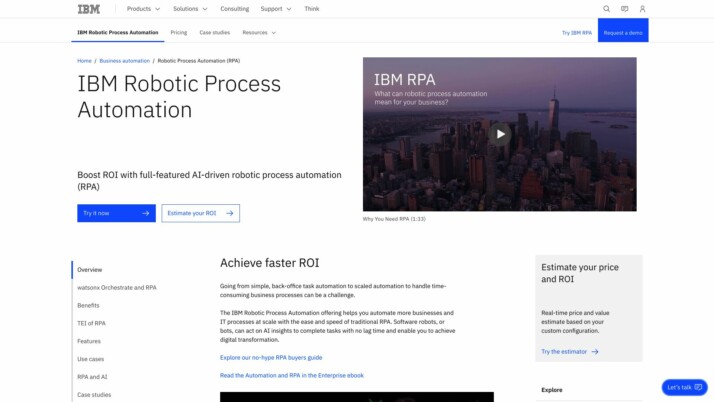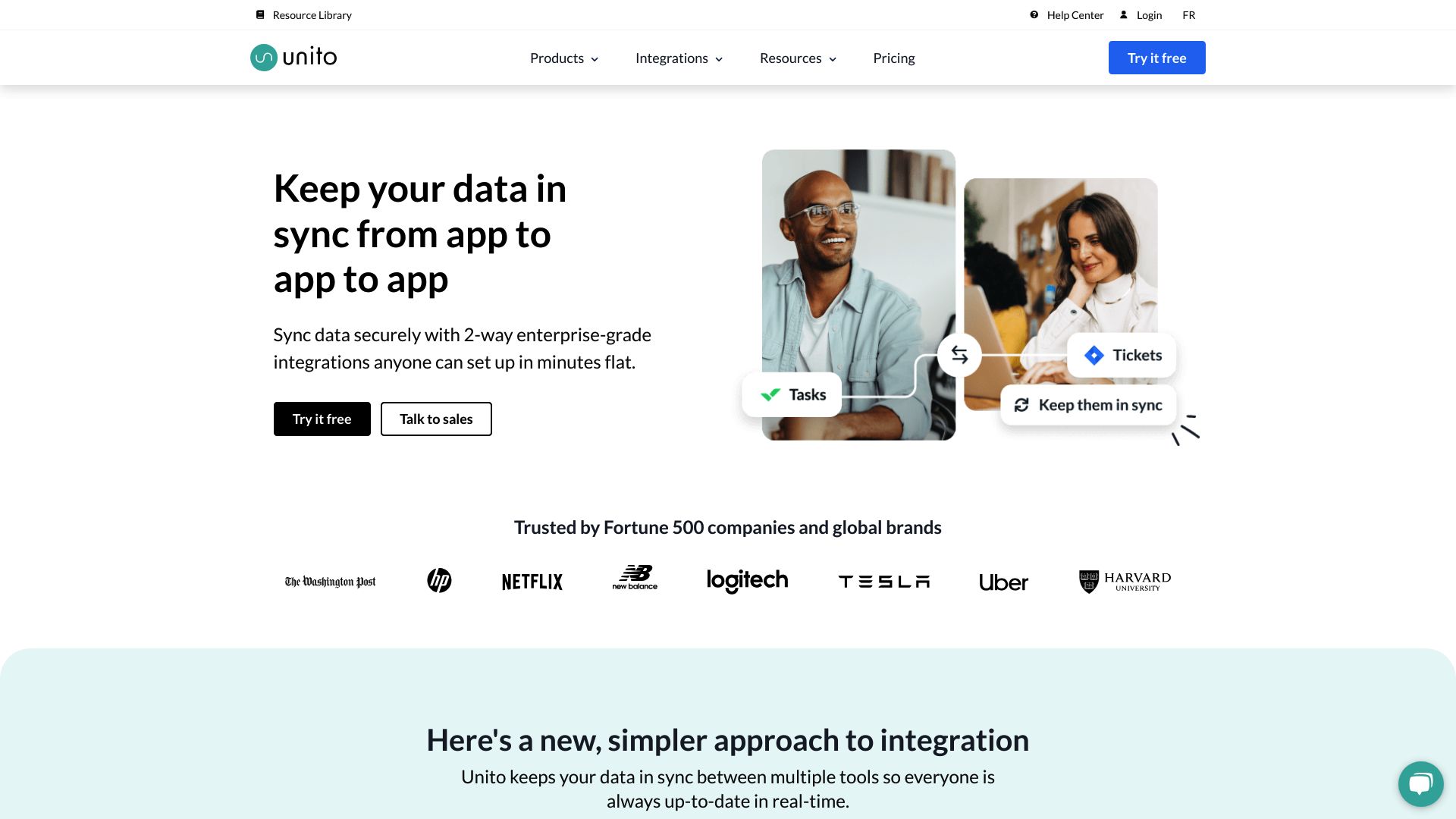IBM RPA vs. Unito: AI-Driven Automation Showdown
AI-driven automation and seamless workflow integration have become essential for businesses seeking to optimize operations and boost productivity. This comparison delves into IBM RPA vs. Unito, and SmythOS, three platforms at the forefront of this technological revolution.
IBM RPA offers robust robotic process automation for enterprise-scale tasks, while Unito excels in real-time synchronization between diverse tools. SmythOS, however, emerges as a game-changer, combining advanced AI capabilities with unparalleled flexibility and ease of use. This analysis explores how each platform addresses key challenges in automation, integration, and AI deployment, helping you determine which solution best fits your organization’s unique needs and goals.
IBM RPA Overview
IBM RPA transforms business processes with intelligent automation. This robust platform empowers organizations to create, deploy, and manage software bots that streamline repetitive tasks across enterprise systems.


At its core, IBM RPA offers a comprehensive suite for building and orchestrating automation workflows. The visual builder enables rapid bot creation through drag-and-drop interfaces, catering to both developers and business users. For complex scenarios, the platform supports AI-driven decision-making through integration with IBM’s watsonx Orchestrate.
IBM RPA transforms business processes with intelligent automation. This robust platform empowers organizations to create, deploy, and manage software bots that streamline repetitive tasks across enterprise systems.
IBM RPA excels in enterprise-grade scalability and security. The platform supports concurrent bot execution, allowing businesses to automate at scale. Robust governance features, including integration with IBM OpenPages, ensure compliance and transparency in automated processes. The ability to work with various systems — from legacy mainframes to modern APIs — showcases IBM RPA’s versatility in diverse IT landscapes.
While IBM RPA offers powerful capabilities, its enterprise focus may present a steeper learning curve for smaller organizations or individual users. The platform’s strength lies in large-scale, complex automations rather than simple, standalone tasks. Additionally, while it offers AI integration, it may not provide the same level of advanced AI agent capabilities as some specialized platforms.
IBM RPA positions itself as a comprehensive solution for businesses seeking to drive efficiency through intelligent automation. Its integration capabilities, scalability, and focus on governance make it particularly appealing for large enterprises with complex IT ecosystems and stringent regulatory requirements.
Unito Overview
Unito revolutionizes workflow integration with its advanced Sync Platform. This robust system seamlessly connects diverse tools used by teams across organizations, eliminating data silos and enhancing collaboration.
Unito’s platform excels in real-time two-way synchronization, ensuring data consistency across connected applications. It offers unparalleled flexibility with deep field configuration, allowing users to customize syncing to match specific workflow requirements. The self-serve setup empowers users to independently configure and initiate integrations, reducing dependency on IT teams.
Unito revolutionizes workflow integration… seamlessly connects diverse tools used by teams across organizations, eliminating data silos and enhancing collaboration.


Key features set Unito apart in the market. Its custom field syncing accommodates highly specific user needs, while attachment streaming allows users to view files without switching tools. The platform’s comment syncing feature ensures feedback flows seamlessly across applications, maintaining context and collaboration.
Unito’s commitment to security is evident in its SOC II Type 2 certification, providing enterprise-level protection for sensitive data. The platform integrates with industry-leading tools like Asana, Jira, Trello, and GitHub, offering a comprehensive solution for cross-tool collaboration.
Unito’s commitment to security is evident in its SOC II Type 2 certification, providing enterprise-level protection for sensitive data.
While Unito excels in integration and synchronization, it may face challenges in areas like AI agent development or advanced automation capabilities compared to specialized AI platforms. However, its focus on seamless data flow and tool integration positions it as a valuable asset for organizations seeking to streamline their workflows and break down communication barriers between teams using different software tools.
Feature Comparison
IBM RPA and Unito offer distinct approaches to workflow automation and integration. IBM RPA excels in robotic process automation, providing tools to build software bots that automate repetitive tasks across enterprise systems. It features AI-driven decision-making through watsonx Orchestrate integration and supports concurrent bot execution for scalable automation. IBM RPA’s enterprise focus includes robust governance features and integration with legacy systems.
Unito, on the other hand, specializes in workflow integration, offering real-time two-way synchronization between diverse tools. It stands out with its deep field configuration capabilities, allowing highly customized syncing between applications. Unito’s self-serve setup empowers users to configure integrations independently, reducing IT dependency. While it lacks the advanced AI agent capabilities of IBM RPA, Unito’s strength lies in seamless data flow and breaking down communication barriers between teams using different software tools.
In terms of security, both platforms prioritize enterprise-grade protection. IBM RPA integrates with IBM OpenPages for governance, while Unito boasts SOC II Type 2 certification. However, IBM RPA offers more comprehensive AI and automation features, including unattended bots and intelligent chatbots, which are not core focuses of Unito’s integration-centric platform.
Feature Comparison Table
| IBM RPA | Unito | SmythOS | |
|---|---|---|---|
| CORE FEATURES | |||
| AI Agents | ❌ | ✅ | ✅ |
| Memory & Context | ❌ | ✅ | ✅ |
| Autonomous Agents | ❌ | ❌ | ✅ |
| Explainability & Transparency | ❌ | ✅ | ✅ |
| Multimodal | ❌ | ❌ | ✅ |
| Problem-Solving Capabilities | ❌ | ✅ | ✅ |
| Multi-Agent Collaboration | ❌ | ✅ | ✅ |
| Human-AI Interaction | ✅ | ❌ | ✅ |
| Work as Team | ❌ | ✅ | ✅ |
| Agent Work Scheduler | ✅ | ❌ | ✅ |
| SECURITY | |||
| Constrained Alignment | ❌ | ✅ | ✅ |
| OAuth | ❌ | ✅ | ✅ |
| IP Control | ❌ | ❌ | ✅ |
| COMPONENTS | |||
| Foundation AIs | ❌ | ❌ | ✅ |
| Huggingface AIs | ❌ | ❌ | ✅ |
| Zapier APIs | ❌ | ✅ | ✅ |
| Classifiers | ❌ | ❌ | ✅ |
| Logic | ✅ | ✅ | |
| Data Lakes | ❌ | ❌ | ✅ |
| DEPLOYMENT OPTIONS (EMBODIMENTS) | |||
| Deploy as Webhook | ❌ | ❌ | ✅ |
| Staging Domains | ❌ | ❌ | ✅ |
| Production Domains | ❌ | ✅ | ✅ |
| API Authentication (OAuth + Key) | ❌ | ✅ | ✅ |
| Deploy as Site Chat | ❌ | ❌ | ✅ |
| Deploy as Scheduled Agent | ✅ | ❌ | ✅ |
| Deploy as GPT | ❌ | ❌ | ✅ |
| DATA LAKE SUPPORT | |||
| Hosted Vector Database | ❌ | ❌ | ✅ |
| Sitemap Crawler | ❌ | ❌ | ✅ |
| YouTube Transcript Crawler | ❌ | ❌ | ✅ |
| URL Crawler | ❌ | ❌ | ✅ |
| PDF Support | ✅ | ❌ | ✅ |
| Word File Support | ✅ | ❌ | ✅ |
| TXT File Support | ✅ | ❌ | ✅ |
Best Alternative to IBM RPA and Unito
SmythOS stands out as the superior alternative to IBM RPA and Unito, offering a comprehensive AI automation platform that combines ease of use with powerful features. Our platform enables users to create and deploy AI agents 99% faster than traditional methods, revolutionizing workflows across industries.
SmythOS stands out as the superior alternative to IBM RPA and Unito, offering a comprehensive AI automation platform that combines ease of use with powerful features.
Unlike IBM RPA’s focus on robotic process automation or Unito’s emphasis on tool integration, SmythOS provides a versatile ecosystem for building intelligent agents. We offer a user-friendly drag-and-drop interface that simplifies complex AI development, making it accessible to both technical and non-technical users. This approach democratizes AI creation, allowing businesses to innovate rapidly without extensive coding knowledge.
SmythOS excels in its extensive feature set, surpassing both IBM RPA and Unito in critical areas. Our platform supports autonomous agents, multimodal interactions, and advanced problem-solving capabilities. These features enable the creation of sophisticated AI solutions that can handle complex tasks across various domains. Additionally, SmythOS offers seamless integration with multiple AI models and APIs, providing unparalleled flexibility in building customized solutions.
SmythOS excels in its extensive feature set, surpassing both IBM RPA and Unito in critical areas. Our platform supports autonomous agents, multimodal interactions, and advanced problem-solving capabilities.
The unlimited use cases supported by SmythOS set it apart from competitors. While IBM RPA focuses primarily on enterprise process automation and Unito on workflow synchronization, our platform enables the development of AI agents for diverse applications. From intelligent chatbots and data analysis tools to automated decision-making systems, SmythOS empowers users to create AI solutions tailored to their specific needs, regardless of industry or scale.
By choosing SmythOS, businesses gain access to a cutting-edge AI platform that combines ease of use, extensive features, and limitless possibilities. Our solution not only addresses the limitations of IBM RPA and Unito but also opens up new horizons for AI-driven innovation and efficiency across organizations of all sizes.
Conclusion
IBM RPA and Unito offer powerful solutions for enterprise automation and workflow integration respectively. IBM RPA excels in creating software bots for repetitive tasks, featuring AI-driven decision-making and scalable automation. Unito shines in real-time data synchronization between diverse tools, breaking down communication barriers.
However, SmythOS emerges as the superior choice, combining the strengths of both platforms while offering unparalleled versatility. Our drag-and-drop interface allows users to create complex AI workflows without extensive coding, democratizing AI development. With support for over 300,000 integrations and compatibility with leading AI models, SmythOS offers unmatched flexibility in crafting tailored solutions.
Unlike IBM RPA and Unito, SmythOS enables multi-agent orchestration, allowing AI agents to collaborate on complex tasks. Our “Create Once, Deploy Anywhere” approach surpasses the deployment options of both competitors, allowing seamless integration across various platforms including Google Vertex, Microsoft Copilot, and even as ChatGPT plugins.
Experience the future of AI automation with SmythOS. Create a free account to build unlimited AI agents and explore our diverse range of templates to jumpstart your projects. For those ready to revolutionize their workflows, dive into our comprehensive documentation and unleash the full potential of AI in your business. SmythOS — where innovation meets simplicity in AI automation.
Last updated:
Disclaimer: The information presented in this article is for general informational purposes only and is provided as is. While we strive to keep the content up-to-date and accurate, we make no representations or warranties of any kind, express or implied, about the completeness, accuracy, reliability, suitability, or availability of the information contained in this article.
Any reliance you place on such information is strictly at your own risk. We reserve the right to make additions, deletions, or modifications to the contents of this article at any time without prior notice.
In no event will we be liable for any loss or damage including without limitation, indirect or consequential loss or damage, or any loss or damage whatsoever arising from loss of data, profits, or any other loss not specified herein arising out of, or in connection with, the use of this article.
Despite our best efforts, this article may contain oversights, errors, or omissions. If you notice any inaccuracies or have concerns about the content, please report them through our content feedback form. Your input helps us maintain the quality and reliability of our information.
